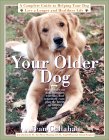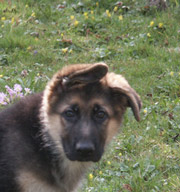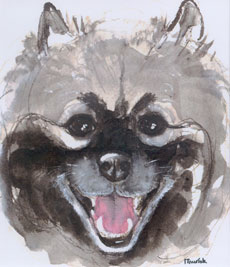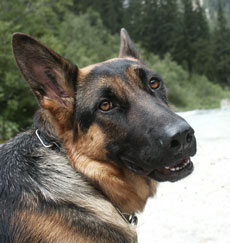Dogs today come in all shapes and sizes, but scientists believe they evolved from just a handful of wolves tamed by humans living in or near China less than 15,000 years ago.
Three research teams have attempted to solve some long-standing puzzles in the evolution and social history of dogs.
Their findings, reported in the journal Science, point to the existence of probably three founding females - the so-called "Eves" of the dog world.
They conclude that intensive breeding by humans over the last 500 years - not different genetic origins - is responsible for the dramatic differences in appearance among modern dogs.
One team studied Old World dogs to try to pin down their origins, previously thought to be in the Middle East.
The other team studied dogs of the New World and found they are not New World dogs at all, but also have their origins in East Asia.
Carles Vila, of Uppsala University, Sweden, one of the team studying the New World dogs, told BBC News Online: "We found that dogs originating in the Old World arrived to the New World with immigrating humans.
"Thus, even before the development of trade as we know it now, humans had to be exchanging dogs."
He added that exactly how or why humans domesticated dogs was not known, but the speed at which they seem to have multiplied and diversified indicates they played an important role in human life.
"I can imagine that if dogs were, for example, improving the quality of hunting, that would be a very great advantage for humans. It could even have made the colonisation of the New World easier.
"There must have been something advantageous about those dogs that made them extremely successful and allowed them to spread all over the world."
Peter Savolainen, of the Royal Institute of Technology, Stockholm, led the study of Old World dogs, analysing DNA samples taken from dogs in Asia, Europe, Africa and arctic America.
Surprise!
His team found that, though most dogs shared a common gene pool, genetic diversity was highest in East Asia, suggesting that dogs have been domesticated there the longest.
"Most earlier guesses have focused on the Middle East as the place of origin for dogs, based on the few known facts - a small amount of archaeological evidence from the region, and the fact that several other animals were domesticated there," he says.
The researchers studied gene sequences from the dogs' mitochondrial DNA, which is inherited directly from the mother. The findings indicated that the major present-day dog populations at some point had a common origin from a single gene pool.
Matthew Binns, head of genetics at the Animal Health Trust in Newmarket, UK, said the findings were significant: "For the first time, there's relatively convincing evidence actually pinpointing the date at which the dog was domesticated and also the location of that domestication, which is a bit of a surprise.
"People have previously thought that a lot of species were domesticated in the Middle East and this data clearly shows domestication took place in East Asia."
He added: "It looks as if 95% of current dogs come from just three original founding females and I guess these are the Eves of the dog world."
Human evolution
In a separate study, researchers at Harvard University and the Wolf Hollow Wolf Sanctuary, both US, studied social cognition in dogs and were surprised by the findings.
In a simple experiment designed to compare their behaviour to those of wolves and our closest relative, the chimpanzee, the findings clearly showed that dogs - even young puppies - were far better at interpreting social cues from humans.
The dogs had to choose which bucket had food hidden underneath it, and the experiment was designed so they could not rely on their superb sense of smell. The scientists helped by pointing or looking in the direction of the hidden food.
Researcher Brian Hare said the dogs outperformed even the chimpanzees, and the puppies were as good as the older dogs, proving the skill was innate and not learned.
"During domestication there was some kind of change in their cognitive ability that allowed them to figure out what other individuals wanted using social cues. The biggest surprise was the puppies - even as young as nine weeks old, they're better than an adult chimpanzee at finding food."
He said the research might ultimately provide some clues as to how social skills evolved in humans.
 "This is a magical book! The photographs were wonderful, really capturing the magic of these wonderful dogs in a heartfelt, touching, and oftentimes incredibly funny manner! I particularly liked to see which states my favorite dogs came from! It seems there are nice dogs ALL OVER the country!Thank you, Mr. Selis, for this "doggone" WONDERFUL treasure!"
"This is a magical book! The photographs were wonderful, really capturing the magic of these wonderful dogs in a heartfelt, touching, and oftentimes incredibly funny manner! I particularly liked to see which states my favorite dogs came from! It seems there are nice dogs ALL OVER the country!Thank you, Mr. Selis, for this "doggone" WONDERFUL treasure!"
Are YOU your best friend's best friend?
Timeless Wisdom
 "I have used this book to train all types of family pets, both puppies and adults, from Golden Retrievers to Wolf Hybrids and it works! My friends refer to me as "the Dog Lady" because I always seem to have some tip to help with their dog's training. It's no secret that I get it all from this wonderful book. With insight into the canine psyche that is years ahead of its time, the monks help the dog owner understand the mind of the dog. The section on discipline is tempered with a word of caution, and encourages you to take your cue from your dog - excellent advice. They are also decades ahead of their time in suggesting Vitamin B complex as "behavioral insurance," making the early connection between vitamin supplementation, good diet, and behavior. With the focus on human brain development and vitamin supplementation in the media these days, its amazing that the monks were making this connection with dogs more than 20 years ago."
"I have used this book to train all types of family pets, both puppies and adults, from Golden Retrievers to Wolf Hybrids and it works! My friends refer to me as "the Dog Lady" because I always seem to have some tip to help with their dog's training. It's no secret that I get it all from this wonderful book. With insight into the canine psyche that is years ahead of its time, the monks help the dog owner understand the mind of the dog. The section on discipline is tempered with a word of caution, and encourages you to take your cue from your dog - excellent advice. They are also decades ahead of their time in suggesting Vitamin B complex as "behavioral insurance," making the early connection between vitamin supplementation, good diet, and behavior. With the focus on human brain development and vitamin supplementation in the media these days, its amazing that the monks were making this connection with dogs more than 20 years ago."
This is a must read for all dog owners.

 "After giving a few copies of Dogtionary as Christmas gifts, I am ordering a few more because the book was such a big hit with my friends. These dog portraits are beautiful and yet so simple. Any dog owner who has struggled to get a good picture of their pet can take inspiration from this book. Sharon Montrose clearly knows and loves her subjects well."
"After giving a few copies of Dogtionary as Christmas gifts, I am ordering a few more because the book was such a big hit with my friends. These dog portraits are beautiful and yet so simple. Any dog owner who has struggled to get a good picture of their pet can take inspiration from this book. Sharon Montrose clearly knows and loves her subjects well."
A practical and sensitive all-in-one reference
 As a dog owner, you know that caring for your older pet can be a challenge. It's hard to watch your dog - whose frisky puppy days don't seem so long ago -- begin to slow down a little and go gray around the muzzle. But thanks to extraordinary advances in veterinary medicine and pet nutrition, dogs are living longer, and with the right kind of care you can help your pet stay healthy and happy well into his golden years.
As a dog owner, you know that caring for your older pet can be a challenge. It's hard to watch your dog - whose frisky puppy days don't seem so long ago -- begin to slow down a little and go gray around the muzzle. But thanks to extraordinary advances in veterinary medicine and pet nutrition, dogs are living longer, and with the right kind of care you can help your pet stay healthy and happy well into his golden years.
 "If you love dogs (and/or truly love animals in general), and, like me, berate yourself for sometimes not appreciating our canine friends as much as you should, read this book. I believe people who gave it a bad review are letting their cynicism color their judgement. The fact remains that dogs love us in spite of our flawed human selves, and God bless them for it."
"If you love dogs (and/or truly love animals in general), and, like me, berate yourself for sometimes not appreciating our canine friends as much as you should, read this book. I believe people who gave it a bad review are letting their cynicism color their judgement. The fact remains that dogs love us in spite of our flawed human selves, and God bless them for it."
|





















